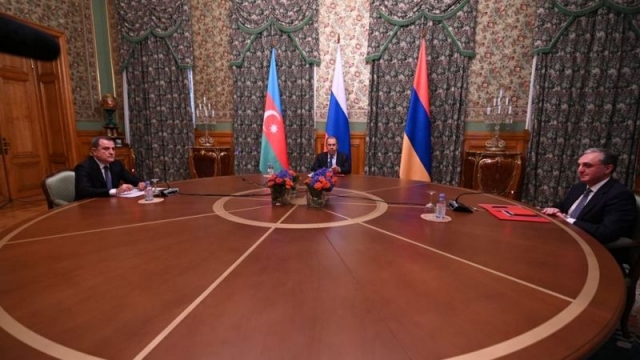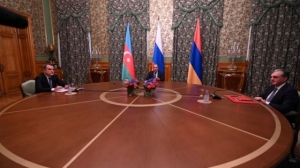Azerbaijan, Armenia Agree to Ceasefire After Talks in Moscow
Russian Foreign Minister Sergei Lavrov stated Armenia and Azerbaijan have agreed to a ceasefire, starting today, to exchange prisoners and the bodies of those killed in the Nagorno-Karabakh conflict.
Lavrov made the statement after 10-hour-long talks with Armenian Foreign Minister Zohrab Mnatsakanyan and Azerbaijani Foreign Minister Jeyhun Bayramov.
He added that Armenia and Azerbaijan also agreed to start talks on the settlement of the conflict.
Lavrov introduced the 4 points of the agreement to journalists at a press conference:
- A ceasefire will be declared for humanitarian purposes from 12:00 on October 10, with the exchange of prisoners and bodies, mediated by the International Committee of the Red Cross;
- Certain terms of the ceasefire will be additionally agreed upon;
- The Republics of Azerbaijan and Armenia, mediated by the OSCE Minsk Group Co-Chairs, will initiate substantive negotiations to reach a peaceful settlement of the conflict as soon as possible;
- The parties confirm the invariability of the format of the negotiations [the co-chairs of the OSCE Minsk Group are the Russian Federation, the US and France].
The deal was reached in accordance with what Russian President Vladimir Putin, Azerbaijani President Ilham Aliyev and Armenian Prime Minister Nikol Pashinyan have agreed upon, the Russian Foreign Ministry said.
Moscow had repeatedly urged a ceasefire and a political settlement of the differences.
Prior to the start of the negotiations, President Aliyev addressed the population, saying the talks were the last chance for Armenia to leave the occupied territories.
"I have changed the status quo on the battlefield, and the Line of Contact (LOC) no longer exists. Karabakh is Azerbaijan," he concluded his address.
The military confrontation between Armenia and Azerbaijan started on September 27 over the disputed Nagorno-Karabakh region. There were large numbers of casualties on both sides.
The Nagorno-Karabakh conflict between the two countries of the South Caucasus began in 1988. Azerbaijan believes that Nagorno-Karabakh and seven surrounding areas - 20% of Azerbaijan - are occupied by the Armenian Armed Forces, which is categorically denied by Armenia.
The parties signed a ceasefire in 1994; however, negotiations between the two countries under the auspices of international organizations are still considered unsuccessful.
By Ana Dumbadze












